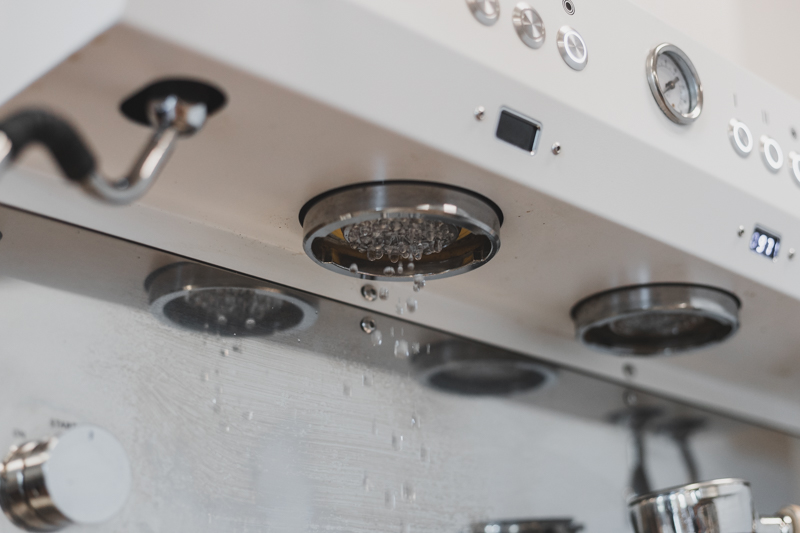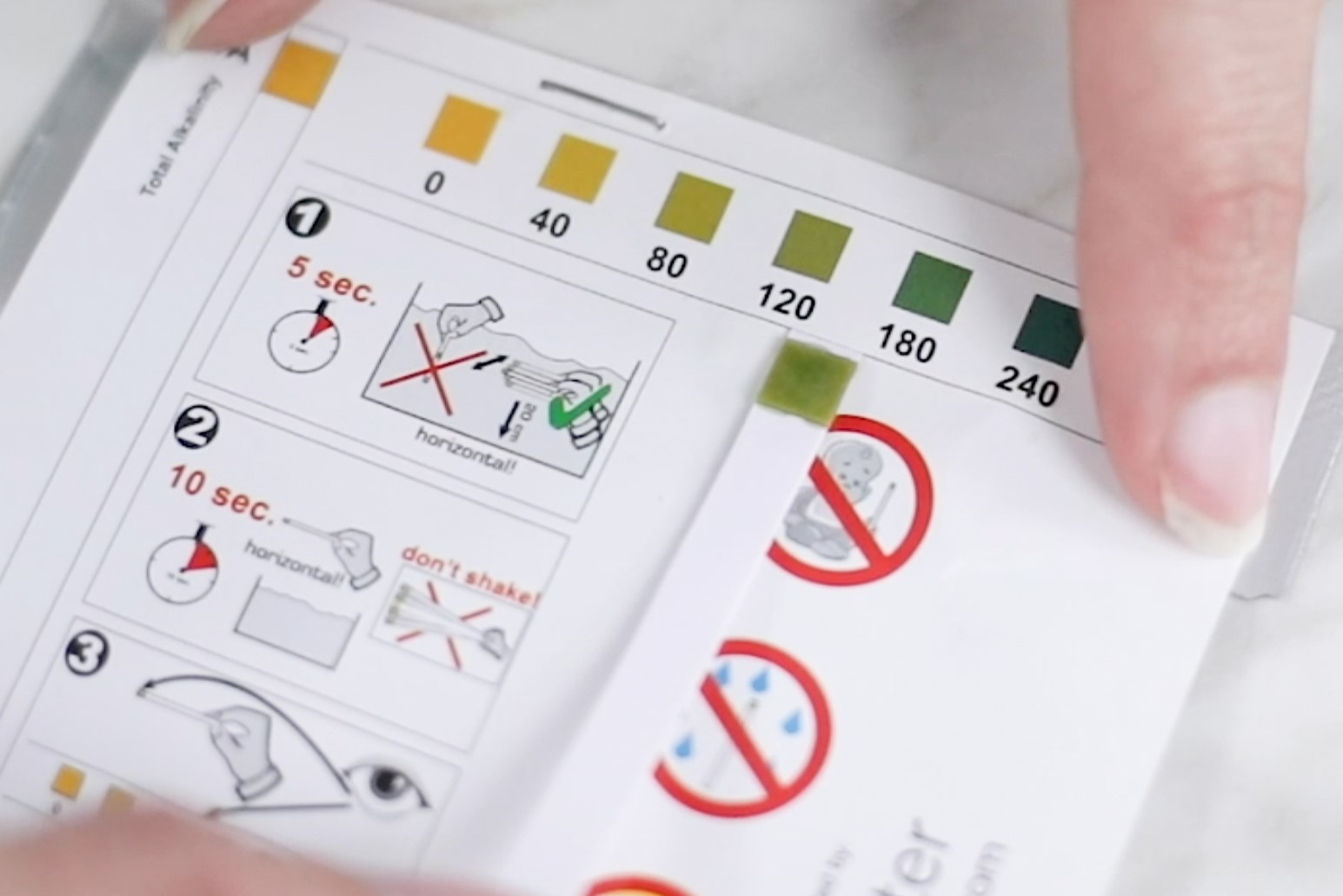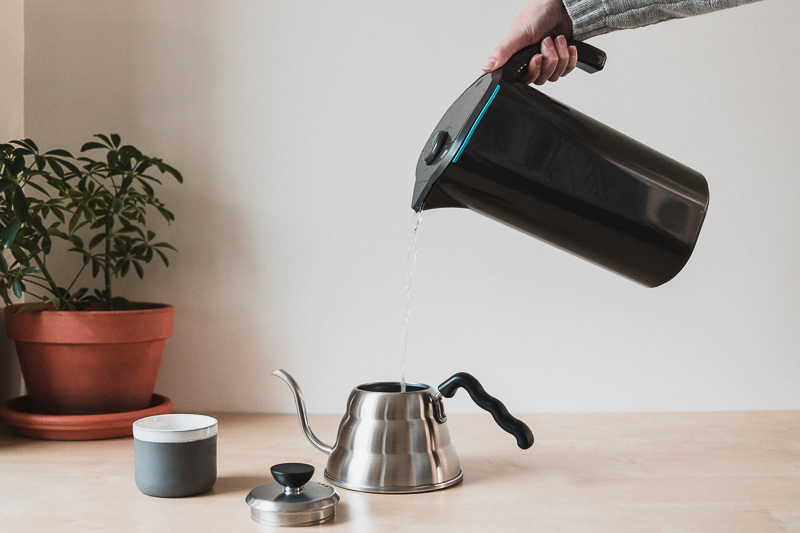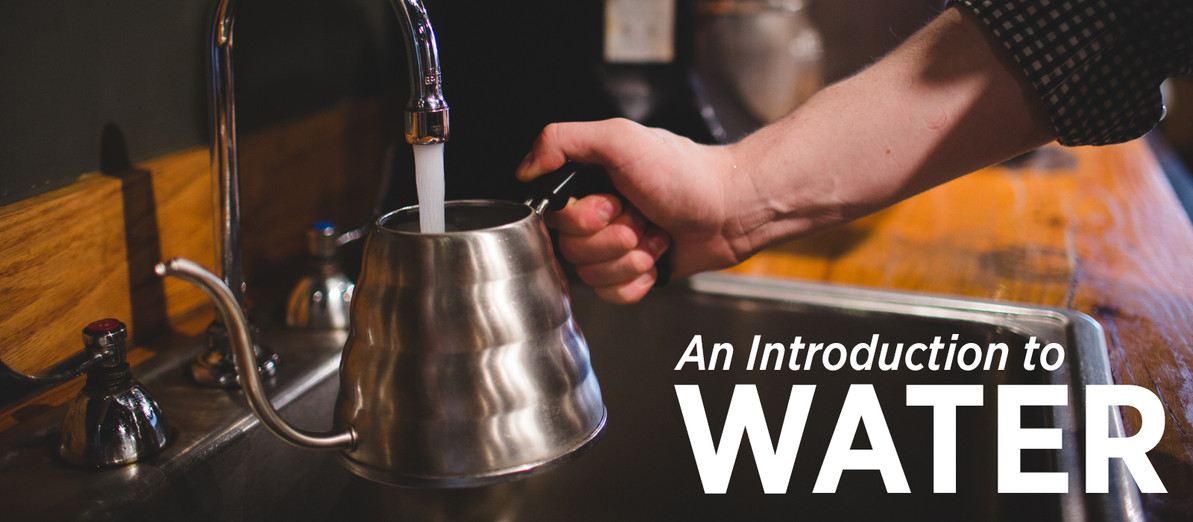H2O, Hello There: An Introduction to Water for Coffee Brewing
Have you ever taken a bag of beans home from your favorite shop, brewed a cup of coffee according to the recipe printed on the bag, and found the result to be lackluster, completely different from that cup you enjoyed in the café? Of course you have. We have, too. You might wonder if it was the cafe’s grinder—a Ditting Lab Sweet or EK43—that made all the difference or maybe your technique. True, the grinder is an important player and technique helps, but what if the main difference was actually something else, something without burrs, something invisible to the naked eye? What if a tiny pinch of magnesium or calcium citrate was to blame?

Water Chemistry
When we talk about water in general (as opposed to in coffee), we often talk about purity: removing all the bad stuff. Chemically, though, our brewing water is far from pure—it contains dissolved minerals, chemicals, and gasses, many of which have a noticeable yet easy-to-ignore role to play in coffee brewing. Practically speaking, the best water to brew with tends to taste and smell quite neutral, so it contributes little in the way of off-flavors to the coffee itself. That’s the easy test: just taste and sniff. Scientifically, things get rather more complicated. It takes something as exhaustive as the CityCheck water quality test to get the answers.
In much of the United States, however, the water coming out of your tap tastes and smells perfectly okay thanks to your city water plant. Perhaps at worst you have some strange flavors from old metal pipes, an odor of chlorine, or too much calcium or magnesium from hard water. In many cases in the home, you could simply filter that water and be on the right track for brewing coffee with decent to great flavor. If you’re not all that fussy about your coffee and you’re happy with your brewing results, then the chase might end right there.
A good deal of us, on the other hand, are using somewhat offensive tap water that we would hesitate to drink on its own. This could be due to a well pumping funky groundwater; a contaminated water supply not suitable for drinking; or the municipality is simply an underperformer (you can check here). If that sounds like your situation, you may need to skip the tap entirely and find better water to purchase for coffee brewing.

As we mentioned before: what’s in the water we use for coffee can end up being complicated stuff. Other beverage industries like beer and wine have reams of data and decades of knowledge going into the water they elect to use for their products, and while we can learn a few things from what they already know, coffee is still a different beast and is at a younger stage of its overall evolution as a craft product. We do have some useful general guidelines that we can follow: too much mineral content can cause your coffee to suffer in quality, too much alkalinity can cause a soapy taste or residue, overly hard water can taste bitter or chalky, water with very little mineral content can cause all kinds of strange extractions and off-flavors, and can even cause corrosion of your equipment. Some minerals cause scale buildup that can disable or destroy your coffee brewing gear, while others can erode the internal parts until they spring leaks.
Coffee Water Standards
The Specialty Coffee Association of America has a simple list of standard criteria for brewing water: it should be clean and free of odors, colors, and off-flavors. It should have a neutral pH (neither acidic nor basic), it should have around 150 mg/L of dissolved minerals, including 4 grains of hardness, about 10 mg/L of sodium, and 40 mg/L total alkalinity. While most of us do not own the testing kits needed to see if our desired water is within those parameters, some bottled water options do in fact list some or most of these metrics, and test strips are fairly inexpensive if you’d like to test on your own. The Water Standards are time-tested and generally well accepted, but don’t necessarily align with some of the more contemporary suggestions established by newer research.
What should you do if you’d rather not fuss over all these details, and simply want to brew a decent cup of coffee? In most cases, you can probably head to your local grocery store and stock up on their cheapest spring water. If it tastes good enough on its own, it’s very likely good enough to use for coffee and you needn’t worry about the minutiae. If you’re thinking you’d like to get really great water but aren’t sure how to approach all the chemistry involved, you can even buy products tailored specifically for coffee brewing–some coffee shops will sell you some of their pre-balanced brewing water, or you can buy some distilled or reverse osmosis water (both are heavily purified with almost no mineral content) and add a product like Global Customized Water’s AB Formula or Third Wave Water to treat the water with minerals specifically balanced for brewing coffee. The only drawback of these is that you have to get the distilled water, an extra step that keeps many people from doing it. The Peak Water Pitcher Start Pack uses its unique premium dual-ion resin filter to filter your home tap water to contain the correct amount of minerals for brewing.

The bespoke solutions mentioned above are not a perfect solution for every coffee under the sun. They’re a great way to create a standardized brewing water formula that remains static whether you’re at home or traveling, but you can bet that almost no coffee roaster will be using the same water as you when they develop their coffees and tweak their roasting for certain flavor profiles. They are likely using comprehensive water filtration from OptiPure, BWT, or Everpure, so the stuff we do at home is never going to taste like the stuff at cafes unless we, too, invest in a system.
Final Water Recommendations
Wondering what we wouldn’t recommend? To start, don’t use pure distilled or reverse osmosis (RO) water for coffee brewing. Sometimes these are recommended as they don’t contribute to limescale buildup in drip machines, but they are simply too pure to brew coffee with and you’ll leave a lot of good flavor behind. Also do not use water that doesn’t taste very good on its own. That means that water with noticeable off-flavors like anything chalky, metallic, soapy, or otherwise funky probably won’t do your coffee any favors. Basically, if your water has some minerals dissolved in it and tastes and smells good and clean, you're off to a pretty good start. We would also caution you to use a softener for any water being used in espresso machines, to prevent damage due to limescale buildup.



